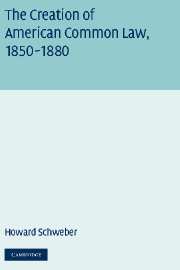 The Creation of American Common Law, 1850–1880
The Creation of American Common Law, 1850–1880 Published online by Cambridge University Press: 22 July 2009
In the 1850s in Illinois, the emphasis on technological progress and its associated virtues became the basis for a reconceptualization of the underlying norms of legal discourse. Between 1850 and 1860, Illinois' Supreme Court articulated a move from the traditional writ-based system of English common law to the modern categories of American legal reasoning. In the process, the judges who created the new doctrines shifted the starting point for legal analysis from private, property-based rights to public tort and tortlike duties. This shift was worked out and articulated almost entirely in railroad cases. To see how this occurred, I will first examine developments in the law governing property interests, the traditional focus of the earlier legal regime and the starting point for the American effort to create a new system of common law. In the next chapter, the same questions will be explored in the context of cases involving injuries to persons.
Clashing Property Rights: Stock Crossing Cases
It is difficult for modern readers to imagine the importance that was attached to the question of whether railroads would be required to pay damages for stock killed by locomotives in the 1850s. In southern Michigan, a “railroad war” developed over the failure of the lines to pay compensation for damage to stray cattle. Farmers tore up lines, and eventually burned the Detroit depot to the ground (Hirschfield, 1952).
To save this book to your Kindle, first ensure no-reply@cambridge.org is added to your Approved Personal Document E-mail List under your Personal Document Settings on the Manage Your Content and Devices page of your Amazon account. Then enter the ‘name’ part of your Kindle email address below. Find out more about saving to your Kindle.
Note you can select to save to either the @free.kindle.com or @kindle.com variations. ‘@free.kindle.com’ emails are free but can only be saved to your device when it is connected to wi-fi. ‘@kindle.com’ emails can be delivered even when you are not connected to wi-fi, but note that service fees apply.
Find out more about the Kindle Personal Document Service.
To save content items to your account, please confirm that you agree to abide by our usage policies. If this is the first time you use this feature, you will be asked to authorise Cambridge Core to connect with your account. Find out more about saving content to Dropbox.
To save content items to your account, please confirm that you agree to abide by our usage policies. If this is the first time you use this feature, you will be asked to authorise Cambridge Core to connect with your account. Find out more about saving content to Google Drive.